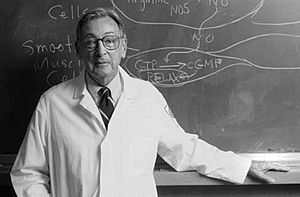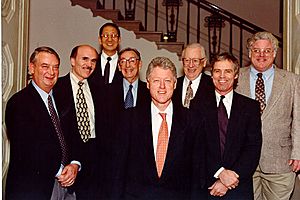Robert F. Furchgott facts for kids
Quick facts for kids
Robert F. Furchgott
|
|
|---|---|
 |
|
| Born |
Robert Francis Furchgott
June 4, 1916 |
| Died | May 19, 2009 (aged 92) Seattle, Washington, U.S.
|
| Alma mater | |
| Spouse(s) | Lenore Mandelbaum (1941–1983; her death; 3 children) Margaret Gallagher Roth (?–2006; her death) |
| Awards | Nobel Prize in Physiology or Medicine in 1998 |
| Scientific career | |
| Fields | Biochemistry |
| Institutions |
|
| Signature | |
 |
|
Robert Francis Furchgott (born June 4, 1916 – died May 19, 2009) was an American scientist. He was a biochemist, which means he studied the chemistry of living things. He won a Nobel Prize for helping discover how a special gas called nitric oxide works in our bodies.
Contents
Robert Furchgott's Life
Growing Up and School
Robert Furchgott was born in Charleston, South Carolina, in 1916. His father owned a department store. He loved science and studied chemistry at the University of North Carolina at Chapel Hill. He graduated in 1937. Later, he earned his Ph.D. (a very high degree) in biochemistry from Northwestern University in 1940. This means he became an expert in the chemistry of living things.
His Work as a Scientist
Dr. Furchgott worked as a professor of pharmacology (the study of how medicines work) at several universities. He taught at Cornell University from 1940 to 1949. Then he moved to Washington University in St. Louis until 1956. After that, he taught at SUNY Downstate Medical Center in Brooklyn until 1989. Finally, he worked at the University of Miami until he retired.
Discovering Nitric Oxide
In 1978, Dr. Furchgott made a very important discovery. He found a substance in the lining of blood vessels (called endothelial cells) that could make the blood vessels relax. He called this substance EDRF, which stood for "endothelium-derived relaxing factor." By 1986, he figured out that EDRF was actually nitric oxide (NO). Nitric oxide is a gas that plays a huge role in how our heart and blood vessels work. It also helps with many other body processes. This discovery was very important for understanding human health and diseases.
Awards and Recognition
In 1998, Dr. Furchgott won the Nobel Prize in Physiology or Medicine. He shared this award with two other scientists, Louis Ignarro and Ferid Murad. They were all recognized for their work on nitric oxide as a new way for cells to communicate. He also received other important awards:
- The Gairdner Foundation International Award in 1991.
- The Albert Lasker Award for Basic Medical Research in 1996.
- The Golden Plate Award from the American Academy of Achievement in 1999.
Family Life
Robert Furchgott was Jewish. He lived most of his life with his family in Woodmere, New York. He was married to Lenore Mandelbaum from 1941 until she passed away in 1983. They had three daughters named Jane, Terry, and Susan. Later in his life, he spent time with Margaret Gallagher Roth, who passed away in 2006. He continued to be a professor emeritus (a retired professor who keeps his title) at the SUNY Downstate Medical Center. In 2008, he moved to Seattle.
His Passing
Robert Furchgott passed away on May 19, 2009, in Seattle. He was 92 years old. He is remembered by his three daughters, four grandchildren, and three great-grandchildren.
See also
 In Spanish: Robert F. Furchgott para niños
In Spanish: Robert F. Furchgott para niños
- List of Jewish Nobel laureates


